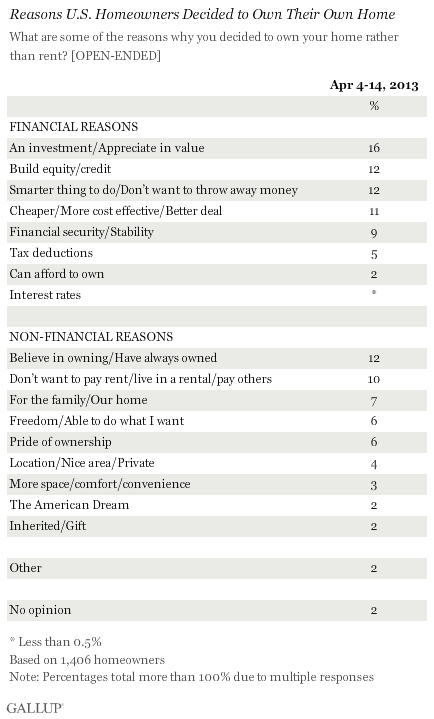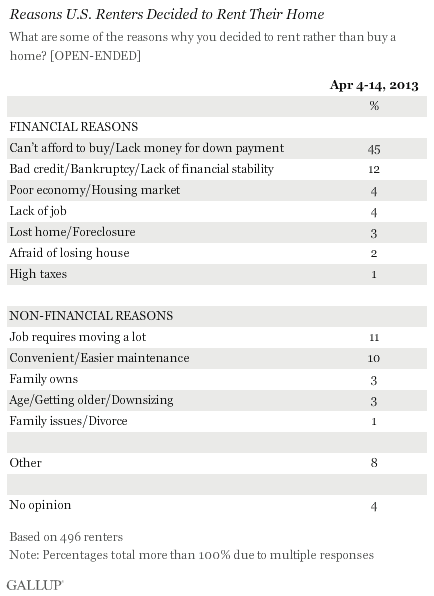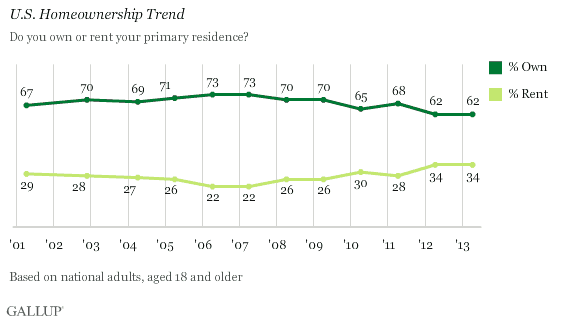PRINCETON, NJ -- American homeowners mention various financial as well as non-financial reasons for deciding to buy a home rather than rent. Homeowners are most likely to say they own a home because it is a good investment or it appreciates in value, with 16% citing these reasons. Another 12% mention building equity or good credit, 12% equate renting with "throwing money away," and 11% say it's cheaper or more cost effective. Chief among the non-financial motives are a general belief in homeownership, mentioned by 12%, and an aversion to living in a "rental" or paying rent to someone else (10%).

Of the various reasons homeowners give for their decision to buy rather than rent, financial reasons outweigh non-financial reasons, but not overwhelmingly.
Less-frequently mentioned financial reasons for owning include "financial security" (9%) and tax deductions (5%), while non-financial reasons include wanting a family home (7%), wanting the freedom to do what one wants with one's home (6%), and pride of ownership (6%). Two percent of homeowners mention "the American Dream."
These results are from Gallup's annual Economy and Finance survey, conducted April 4-14 with more than 2,000 Americans, including 1,406 homeowners and 496 renters on the topic of housing.
This story is part of Gallup's ongoing series "The New American Consumer." Gallup reported Wednesday that public optimism about home values has surged, with 51% now saying they expect home prices to rise in their area, up from 33% a year ago. A report on Friday will look at Americans' projections about their personal plans for homeownership or renting in the future.
BIG TRENDS: Read more in our on going series The New American Consumer
Most Renters Can't Afford to Buy
While the thought behind homeowners' decision to buy their own home may involve a complex mix of financial and non-financial reasons, the reason most renters decide to rent is more straightforward: 45% say they can't afford to buy a home. More specifically, renters say they lack money for a down payment or say homes are too expensive. Another 12% report they have bad credit or lack the financial stability needed to buy, and 4% lack a job. Combined, it's clear the majority of renters feel financially locked out of the housing market.
The most common non-financial reason renters give for renting, rather than buying, is that they move a lot for work, with 11% citing this. Separately, 10% mention the convenience of renting, including easier maintenance because the landlord takes care of the property. Three percent cite their advancing age or desire to downsize.

These findings reflect the relatively youthful, and therefore less affluent, profile of renters relative to homeowners. More than half of renters, 52%, compared with 13% of homeowners, are between 18 and 34, and 47% of homeowners, compared with 17% of renters, are 55 or older. In accordance with renters' relative youth, 44% of renters, compared with 13% of homeowners, make less than $30,000 per year, generally putting their income below the range most people would need to qualify for a mortgage.
Homeownership Rate of 62% Ties 2012 Level for Decade Low
Regarding where Americans live, Gallup finds that 62% of Americans own their own home, 34% rent, and 3% live with their parents. Homeownership this year is tied for the lowest Gallup has seen since 2001 and renting is tied for the highest. Homeownership in Gallup trends since 2001 rose above 70% between 2005 and 2007. It then fell to 70% in 2008 and 65% in 2010, before hitting 62% in 2012, where it stands today.

Gallup's estimate of homeownership is similar to the latest U.S. Census Bureau estimate of 65.4% for the fourth quarter of 2012. Methodological differences between the two surveys could explain the slightly higher homeownership estimate obtained by the Census; however, both surveys show a similar decline in homeownership over the past decade, paralleling the housing crisis brought on by risky mortgages, which in many cases led to foreclosures or forced selling.
Bottom Line
Homeowners are most likely to identify financial reasons as the primary motive for their decision to buy, but many mention non-financial advantages of owning a home that may have helped them cope with the recent housing bubble. Underscoring this, barely a quarter of American homeowners indicate that the opportunity to realize financial gains is why they bought. Thus, homeowners may think about more than just financial aspects when they consider whether owning remains the best option for them.
Most renters cite an inability to afford a home as the main reason they decided to rent. Relatively few talk about any lifestyle benefits unique to renting. This suggests there is tremendous pent-up demand for home buying among the currently bloated population of renters. However, with housing prices now rising again while unemployment remains high, it is unclear how renters will break into the housing market anytime soon.
Gallup will further explore these issues on Friday in part three of its look at housing and homeownership, which will focus on homeowners' and renters' intentions for buying and selling in the next year, five years, 10 years, and beyond.
Survey Methods
Results for this Gallup poll are based on telephone interviews conducted April 4-14, 2013, with a random sample of 2,017 adults, aged 18 and older, living in all 50 U.S. states and the District of Columbia.
For results based on the total sample of national adults, one can say with 95% confidence that the margin of sampling error is ±3 percentage points.
For results based on the total sample of 1,426 homeowners, one can say with 95% confidence that the margin of sampling error is ±3 percentage points.
Interviews are conducted with respondents on landline telephones and cellular phones, with interviews conducted in Spanish for respondents who are primarily Spanish-speaking. Each sample of national adults includes a minimum quota of 50% cellphone respondents and 50% landline respondents, with additional minimum quotas by region. Landline telephone numbers are chosen at random among listed telephone numbers. Cellphone numbers are selected using random digit dial methods. Landline respondents are chosen at random within each household on the basis of which member had the most recent birthday.
Samples are weighted to correct for unequal selection probability, nonresponse, and double coverage of landline and cell users in the two sampling frames. They are also weighted to match the national demographics of gender, age, race, Hispanic ethnicity, education, region, population density, and phone status (cellphone only/landline only/both, cellphone mostly, and having an unlisted landline number). Demographic weighting targets are based on the March 2012 Current Population Survey figures for the aged 18 and older U.S. population. Phone status targets are based on the July-December 2011 National Health Interview Survey. Population density targets are based on the 2010 census. All reported margins of sampling error include the computed design effects for weighting.
In addition to sampling error, question wording and practical difficulties in conducting surveys can introduce error or bias into the findings of public opinion polls.
View methodology, full question results, and trend data.
For more details on Gallup's polling methodology, visit www.gallup.com.
